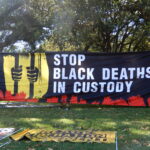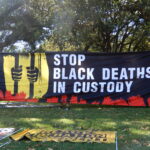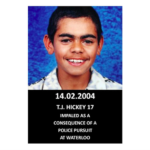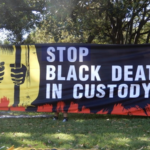NSW Police Officer Charged Over Jai Kalani Wright’s Death in Custody
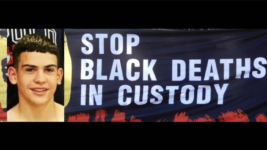
The NSW Director of Public Prosecutions (DPP) announced on Monday, that the NSW police officer who fatally swung an unmarked police car out in front of a trail bike that 16-year-old Jai Kalani Wright was riding has been charged over the incident.
Sergeant Benedict Bryant has been charged with one count of dangerous driving occasioning death and another of negligent driving occasioning death. Both are serious and mark another recent rare departure from the norm, which has permitted officers to avoid criminal scrutiny over such deaths.
The unmarked police vehicle collided head-on into the Dunghutti teen at an intersection in Eveleigh on 19 February 2022, and he died the next day due to head injuries. Yet, questions remain about an alleged pursuit. And the charging on Monday marked the two year anniversary of the lethal collision.
Multiple news reports on the day of the incident had reported a stolen trail bike and a black Mercedes being spotted earlier by police that morning. And there’s footage of police chasing a third white BMW, while a witness spoke of hearing a noisy pursuit and subsequent crash.
NSW state coroner Teresa O’Sullivan presided over the coronial inquest into the boy’s death, suspending it on the second day of an expected two weeks’ worth of hearings, and referred it to the DPP for potential criminal charges on 30 January, in light of the evidence heard.
State coroner referral
Wright’s death is considered a death in custody, as, according to the 1991 Royal Commission into Aboriginal custody deaths recommendations, such a death occurs in the custody of police or corrections, it can involve injury or neglect, and it can occur during attempt to detain or escape.
The RCIADIC recommendations, of which there were 339, established the requirement that all custody deaths undergo the coronial process. However, the nationwide investigation of First Nations custody deaths did not bring an end to them, with an additional 560 such deaths since occurring.
For the inquest relating to an Aboriginal death in custody to be brought to a halt and refer an officer involved to the DPP is a rare occurrence. It’s only happened once before in living memory, and it likely marked the first time in the history of the colony and state of NSW.
The first time involved the state’s top coroner O’Sullivan as well. On that occasion she adjourned the October 2020 coronial inquiry into the death of 43-year-old Wiradjuri man Dwayne Johnston on the third day of hearings and referred the matter to the DPP for potential criminal charges.
Black Lives Matter protests had been occurring in Sydney over the months prior to O’Sullivan making her first referral. And these actions had a clear focus on justice in regard to First Nations deaths in custody, and they were accompanied by strong media coverage.
The referral resulted in an Australian first as the prison guard was then charged with manslaughter in February 2021, which was later upgraded to murder the following year. However, the officer who shot the fleeing handcuffed and shackled Wiradjuri man in the back was acquitted last November.
The creep toward accountability
These developments, and a few others recently, seem to reflect a slight creep towards accountability for deaths in custody, despite the fact than none has actually been forthcoming, as police officers and prison guards, who’d previously had unspoken immunity, are turning up in court on charges.
The death of Wright was also significant in its similarity to the death of TJ Hickey, which occurred in Redfern on 14 February 2004, and involved two police vans chasing down a 17-year-old Gomeroi teen. Yet, at the inquest, the paddy wagons following the boy were not assessed as being in pursuit.
Another key development towards a measure of accountability saw Northern Territory police constable Zachary Rolfe charged with the murder of Warlpiri teen Kumanjayi Walker, whom the officer shot three times at close range in a family home in Yuendumu in the continent’s centre.
Happening just days after the shooting death in November 2019, this marked the first time a police officer had been charged over the murder of an Aboriginal person in custody. And the circumstances of the killing appear to have necessitated such an immediate response in the pressing of charges.
Rolfe was charged with a sliding scale of offences: murder, manslaughter and violent act causing death. Yet, despite having shot Walker twice at close range directly in the ribcage, while his partner was on top of the boy, the now former NT officer was acquitted of all charges.
The following February then saw a Western Australian police officer charged with murder over the shooting death of Yamatji woman JC on 17 September 2019. Yet, despite having shot the 29-year-old woman while she was surrounded by police, the officer involved was acquitted in October 2021.
Potential accountability awaits
The officer charged over the death of Wright will appear in court on 21 March. Dangerous driving causing death carries a maximum penalty of 10 years gaol time, while the lesser negligent driving charge involves up to 18 months for a first offence or 2 years for a subsequent charge within 5 years.
During the two days of hearings, counsel assisting Peggy Dwyer SC outlined that there was no controversy surrounding the fact that Wright died of critical head injuries, however how the unmarked police car came to slam directly into the trail bike is a contentious matter.
The barrister further pointed out that when the stolen vehicles were spotted in the vicinity of Newtown Station earlier that day, police were directed to keep an eye out, but not to pursue them. Although footage and eyewitness accounts tend to point to an alleged pursuit.
Images of the wreckage shown were met with audible gasps in the NSW Coroner’s Court. And the 16-year-old driver of the black Mercedes was apprehended and arrested by NSW police just 200 metres away from where the unmarked car came to impact the trail bike the boy was riding.


